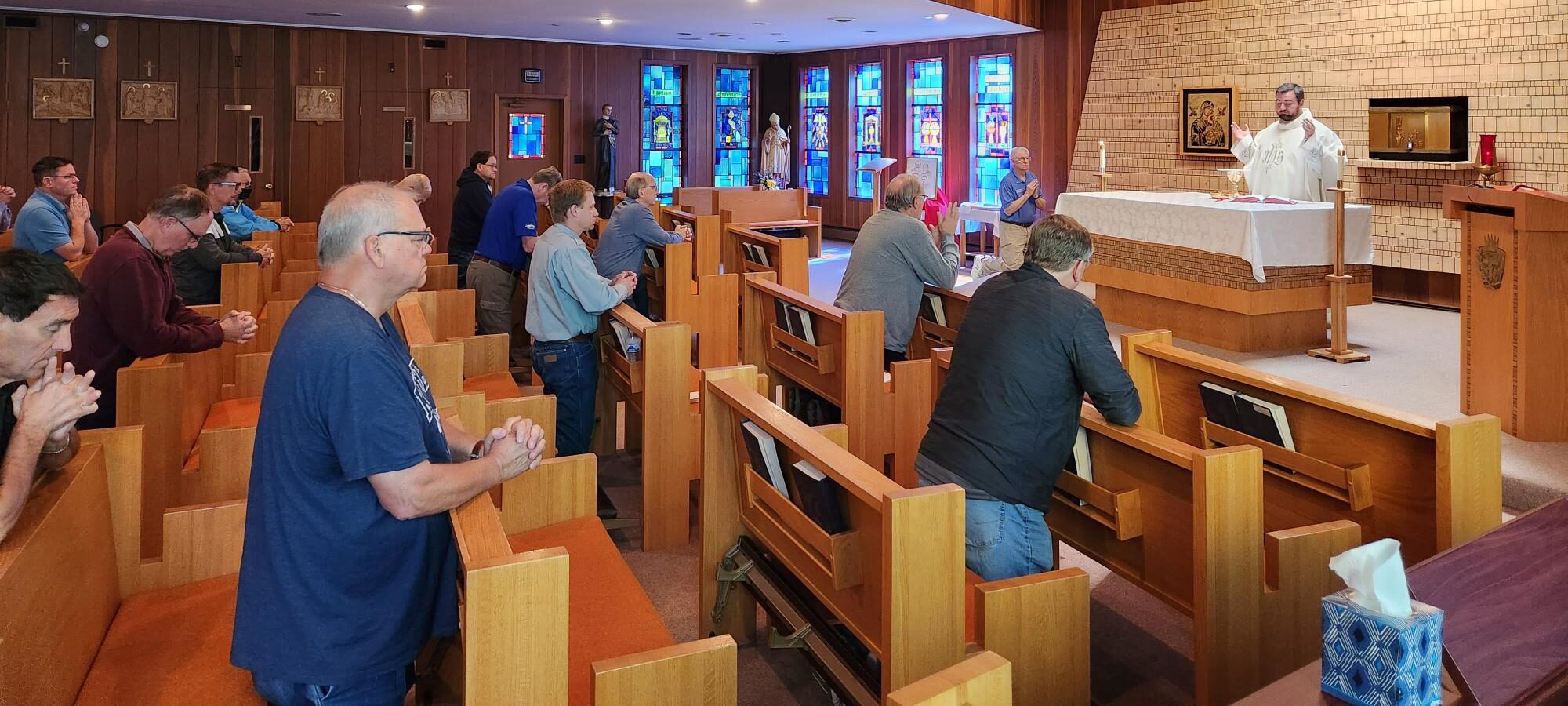
Men attend Mass at a recent retreat hosted by Knights of Columbus Council 4648 at Redemptorist Retreat Center in Oconomowoc. The Knights’ new Cor initiative is about providing evangelizing formation experiences for all Catholic men. (Submitted photo)
Knights of Columbus is known the world over as a charitable organization.
At the heart of every hour volunteered and every dollar donated is the order’s identity as a group of Catholic men seeking truth in the person of Jesus Christ.
To reflect that mission, Knights of Columbus has rolled out a bold new initiative aimed at forming Catholic men as courageous witnesses to the Gospel who are strengthened by a brotherhood of faith.
Cor (Latin for “heart”) is a movement focused on prayer, formation and fraternity that is being introduced by Knights of Columbus councils in individual parish communities. Last year’s pilot phase for the initiative saw it implemented in 21 jurisdictions; this year the Knights are adding 40 more, including Wisconsin.
Andrew Orgovan, Director of Evangelization and Faith Formation for the Wisconsin State Council of the Knights of Columbus, just returned from four days in New Haven, Connecticut, where approximately 600 other Knights from around the world were trained both in person and virtually in preparation for the initiative’s official rollout.
Calling Cor “a mission to the Church that includes all Catholic men,” Orgovan, a parishioner at St. Dominic Parish in Brookfield, said that the initiative is bringing Knights of Columbus “back to its roots.”
“When Fr. McGivney started the order, one of the reasons was his concern for the spiritual well-being of the men in his parish, staying focused on the faith,” said Orgovan, noting that the order was formed in a time of pronounced anti-Catholic sentiment.
Knights of Columbus was founded in 1882 by Fr. (now Blessed) Michael McGivney, a young priest in New Haven whose parish served a mostly immigrant Irish community. In the nativist cultural imagination of the time, Irish Catholics were cast as interlopers in American Protestant society, foreigners whose obedience to church hierarchy made them un-American.
Knights of Columbus was a fraternal benefit society, but it also functioned as a way for members to be renewed and reinvigorated in faith. In other words, it was a beating Catholic heart for a community of men who existed on the periphery of mainstream culture, a vital organ of fellowship and formation.
“It’s pretty interesting how we’re coming back to that (culture of prejudice and anti-Catholicism in the modern world) — the very reason the order was formed is resurfacing,” said Orgovan. “We have moved out of the Christendom age of the church into an apostolic age, as the world around us becomes more and more secularized.”
The response of Knights of Columbus is to focus on re-evangelizing Catholic men, who in turn will evangelize their families and the communities around them.
“The young men coming to Cor sessions are searching. They’re looking for something,” said Orgovan. “They know (the world) is against them, and they have to respond to the promptings in their heart. They know instinctively they’ve got to do something. They’ve got to start looking at their faith more seriously.”
Cor will provide opportunities for men to come together in experiences of prayer, spiritual formation and fraternity. The Knights of Columbus website offers suggestions for the content and structure of the meetings, including devotions and formational literature and videos. Cor is open to all Catholic men of a parish, who do not need to be members of the Knights to participate.
Orgovan will begin training other Knights of Columbus state officers and directors beginning in October. All councils in Wisconsin are encouraged to consider implementing Cor, and Orgovan said he hopes that at least 10 councils across the state will do so within the next eight to 10 months.
Supreme Knight Patrick Kelly, the Chairman of the Board and Chief Executive Officer for the national Knights of Columbus, called Cor “a game changer” in his 2023 annual report.
“In this new era, forming Catholic men must be our top priority,” he wrote. “Cor is very practical, and proving very effective. It’s already helping men be better husbands, fathers and Catholics.”
Cor will not be in competition with any other already thriving men’s groups within a parish community, Orgovan said, noting that he himself is a member of his parish’s chapter of That Man is You. The goal instead is to complement and collaborate with such groups.
“There’s a lot of fruit out there that needs to be gathered,” he said. “There’s a lot of work to be done.”
What sets Cor apart is its mission of forming a man’s understanding of himself as a disciple of Christ, and positioning that identity as the wellspring for all his future acts of service. “It’s about who you are,” said Orgovan.
Last year, the 67 councils in the Archdiocese of Milwaukee donated nearly $1.2 million toward different charitable organizations and reported 150,000 volunteer hours. Their charitable endeavors benefitted Catholic schools and parishes, pregnancy resource centers, vocations support, community projects and much more.
But all of it is a hollow gesture if each Catholic man is not motivated by a personal relationship with Jesus Christ, said Orgovan.
“If you don’t have it, how can you give it away?” he said. “We have to evangelize ourselves and intentionally desire to grow closer to Christ so that we can take Jesus out to the world.”
